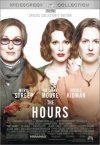BUY THE DVD:
|


|
|
|
SYNOPSIS:
| |
story revolves around three women in different eras who are all profoundly affected by the works of virginia woolf.
|
|
|
MOVIE FACT:
| |
nominated for seven golden globe awards before it was even theatrically released.
|
|
|
RATING:
|



three out of four possible stars
|
|
|
|
All Meryl Streep has to do is appear in front of a camera and she is mesmerizing. She could stand mute for two hours and it wouldn't matter if she said a single word. I'd go see the movie. And The Hours is no exception. Every time she's on the screen, Streep emanates so much emotion that her performance can just bring down the house with every word. And the exact same compliments can be paid to Julianne Moore and Nicole Kidman. Interestingly enough, no matter how ugly Virginia Woolf was in life, even a large prosthetic nose cannot make Kidman look any less beautiful than she always is.
Perhaps it's the heavy subject material that these actresses had to sift through for these roles that makes their performances so potent. Of course, to simply label this movie, "tough," might be taking the easy way out. Regardless of how depressing the storyline is (and it is quite a dark festival of the soul) the picture is still a stunning showcase of what three of the world's best actresses are capable of. They're so capable, in fact, that it would have been easy to see the women in three separate full-length feature films. Perhaps one of this film's only drawbacks is that the stories of these women, all living in different eras, are not explored fully.
Though the film is right around two hours long, quite an average length, by the end of the piece there still exists the feeling that something more could have been explored about each of them. Which is really an interesting thought, given that the picture is really about nothing. Sure, there are the emotions and dramatics to deal with, but if you take a close look at the plot, there is none. Perhaps this film heralds a new advent for filmmaking. Plot-less movies. But regardless of the fact that nothing "comes next," Kidman, Streep, and Moore each create such interesting characters with their performances that it is hard for one's attention to stray from the screen.
The word "affecting" could easily be used to describe each of their performances and each actress has the change to strut her stuff at least one during one of three highly charged scenes. Relationships between these characters don't exist for much of the film, yet their problems are what link them together and create a through-line for the audience to follow for the duration of the film. Kidman plays the real-life author, Virginia Woolf, who doesn't like the attentions of so many doctors around her. Moore plays a woman in the 1950's who hates the wife/mother role she's been given in life. And Streep's character, in the present, is giving a part for a friend dying of AIDS.
The supporting cast of the film, including Ed Harris, Allison Janney, and Jeff Daniels, Claire Danes, Toni Collette, and Miranda Richardson (what a cast!!!!) round out the picture sufficiently to give the picture enough different faces to look at to keep the lack of story at bay. In fact the supporting performances are on par with those of the leading ladies. It is interesting, but none of these women or men has anything more than their own emotions to deal with over the course of the picture, and it is those emotions that tear each of them apart. With a musical score that includes a heavy dose of piano, and cinematography that changes subtly between each era, the focus on their emotions is a continuous idea throughout the film. This movie will not appeal to all audiences.
Young audiences, especially teenagers, probably would not appreciate the plethora of soul-bearing and people whose favorite type of film usually include large explosions and car chases might not find much to enjoy. But for those people in the audience who are willing to watch quite an incredible story of human failure and emotion, this movie can be very rewarding. The interesting amount of subject matter notwithstanding, the way each of the stories is presented simultaneously is done very well. The intricate editing needed to make these stories comprehensible must have taken the editor more than a few days to figure out. Often times there is only one shot shown from a specific era before the audience is brought to the next one. And yet the story is always completely clear.
Though the script is not the most ingenious one (regarding the dialogue), the performances more than make up for any deficiencies there. It is the performances that hold this picture together and the lack of story will probably only bother those interested in seeing Meryl Streep involved in a car chase or watching Julianne Moore blow something up. If the demonstration of raw human emotion as affecting as any seen on screen in years is your ticket, The Hours is worth a glance. The fact that each of these filmmakers and actresses took a chance on creating a picture different from the norm and ended up with a movie that can only be described as gripping for each and every one of its 114 minutes.
Review by Kelsey Wyatt.
| |
|